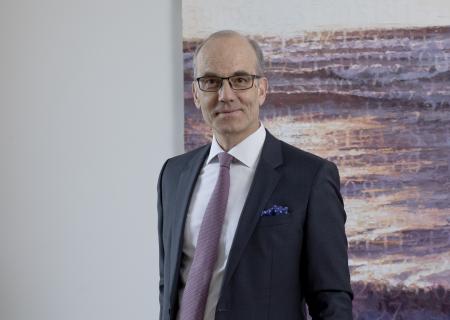Member Profile, James Raynor
Chief Executive Officer of Grosvenor Europe
James Raynor, Chief Executive Officer of Grosvenor Europe, has just recently joined the INREV Management Board and is also the chair of the Fund Management Advisory Council (FMAC). INREV IQ Magazine was delighted to have the chance to speak with him recently about where the non-listed real estate industry is heading and the role INREV can play in advancing its cause.
Grosvenor Europe, which has some £2.4 billion of assets under management, is responsible for the continental European activities of the Grosvenor Group, based in London. In many ways its development has run in parallel with INREV’s, particularly in its adoption of an evolving range of investment vehicles. ‘Going back ten years or so we generally invested through standard fund structures, but most of these have now run the course of their life cycle,’ Raynor explains. ‘In the last five years we have been using joint ventures to a much greater extent, working with institutional partners in relationships that are mutually beneficial and where we can learn from each other. We continue to pursue a similar geographical strategy, focusing on three major cities – Paris, Stockholm and Madrid – but mould our portfolio to help realise our risk and return requirements given prevailing market conditions. For instance, we are moving increasingly into residential, particularly in Madrid, while in Paris core-plus offices are in favour.’
The industry has changed hugely since INREV began, particularly in the way investors want to manage risk and influence decision-making in their portfolios.
Just as Grosvenor Europe has continued to evolve in the face of a changing investment environment, Raynor believes that INREV must also adapt and advance to stay relevant to the current cohort of non-listed market players. ‘The industry has changed hugely since INREV began, particularly in the way investors want to manage risk and influence decision-making in their portfolios. At the same time, management businesses have consolidated, while the industry as a whole has become much more global. Some of these changes have come about indigenously in the business, but others have been affected by external factors – for instance, the heavy cost burden of regulation has encouraged consolidation as it is difficult for many smaller managers to absorb these costs. Other important outside influences are the demand for greater corporate social responsibility and escalating political risk. Five years ago, few of us expected to be working in a world where Brexit or the election of Donald Trump could happen.’
‘We are certainly living through interesting times, and this makes it an exciting time for INREV as well. For one thing we have a new CEO, Lonneke Löwik, who is determined that INREV should refocus on the needs and ambitions its members. This has been the motivation behind the INREV Vision project, and it’s also a major function of the FMAC, which I’m very pleased to be chairing. The Council is there to make sure that INREV understands the concerns of managers, large and small alike, and is carefully structured to reflect a wide range of viewpoints – for instance between those who specialise in the core and opportunistic ends of the investment spectrum. Its members also have a wealth of contacts in the broader management business, which they can bring to bear on the discussions.’
The heavy cost burden of regulation has encouraged consolidation.
‘I was particularly pleased that we were able to have a joint meeting of the FMAC and the INREV Investor Advisory Council before the Annual Conference in Dublin,’ says Raynor, ‘as it allowed for an open discussion between both parts of the industry. Investors and managers clearly rely on each other and share many of the same interests, so it was good to give them the opportunity to meet in a relatively private space. I’m sure this meeting was also very helpful to Lonneke in shaping INREV’s future strategy.’
Wearing his Management Board hat, Raynor sees INREV’s primary role continuing to be that of an organisation of reference, most importantly as a provider of standards and indices for the sector, with the twin aims of fostering best practice and transparency. ‘The Management Board’s role is very much to provide advice and points of view to the CEO. One key question at the moment is how European or how global INREV’s activities should be. We are certainly moving in a more global direction at present, and an important step in this direction will be to attract more Asian investors into the membership, particularly from Korea and Japan, as they are playing a growing role in the European market. This is likely to mean even greater collaboration with our sister organisation, ANREV. I believe it’s important for INREV to keep striving to broaden its membership generally, and there’s always a danger that you can focus too much on the interests of those who already have a strong voice within an organisation like ours.’
‘Going forward, another important area for INREV will be training the next generation of talent in the sector,’ he concludes. ‘This is something that I’ve already championed as past chair of the Training and Education Committee, and I’m particularly proud of the way INREV’s dedicated and capable staff have worked with the industry in this area, understanding its needs and listening to feedback so the courses can keep improving. I believe that this kind of template will continue to underpin our success, right across the organisation.’
Did you know?
One membership, unlimited access
Membership provides unlimited access for all employees – everyone can benefit
Go to create an account inrev.org/user/register








